Analysis and Critique of Research on Witness Questioning Techniques
VerifiedAdded on 2021/04/17
|6
|1134
|49
Report
AI Summary
This report critically analyzes a research study investigating the impact of emotional arousal on eyewitness memory and the subsequent questioning techniques employed by police officers. The study, utilizing a survey design, explores how officers' beliefs about the effect of arousal on memory accuracy influence their choice between open-ended and closed-ended questions during witness interviews. The findings indicate that officers' personal beliefs, rather than adherence to established cognitive interview protocols, may dictate their questioning strategies, potentially leading to the contamination of witness memory. The report evaluates the strengths and weaknesses of the research methods, including the use of questionnaires, representativeness of data, and potential for bias. It also summarizes the study's key results, highlighting the discrepancy between training and practice among police officers, and discusses the implications of these findings for improving investigative techniques and reducing biases. The author reflects on the assignment, emphasizing the importance of empirical processes in research and the need to avoid personal judgments and biases when collecting and interpreting data.
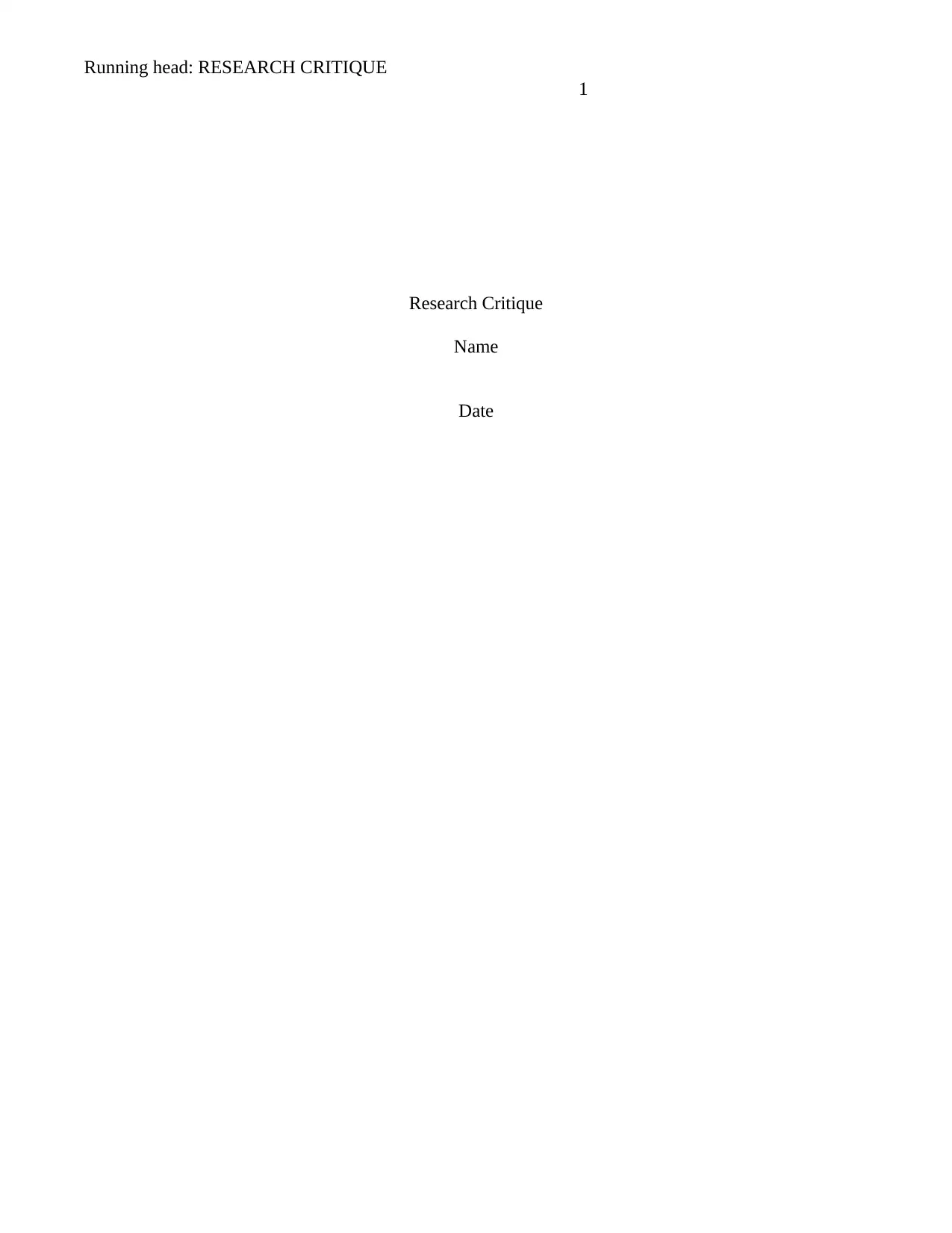
Running head: RESEARCH CRITIQUE
1
Research Critique
Name
Date
1
Research Critique
Name
Date
Paraphrase This Document
Need a fresh take? Get an instant paraphrase of this document with our AI Paraphraser
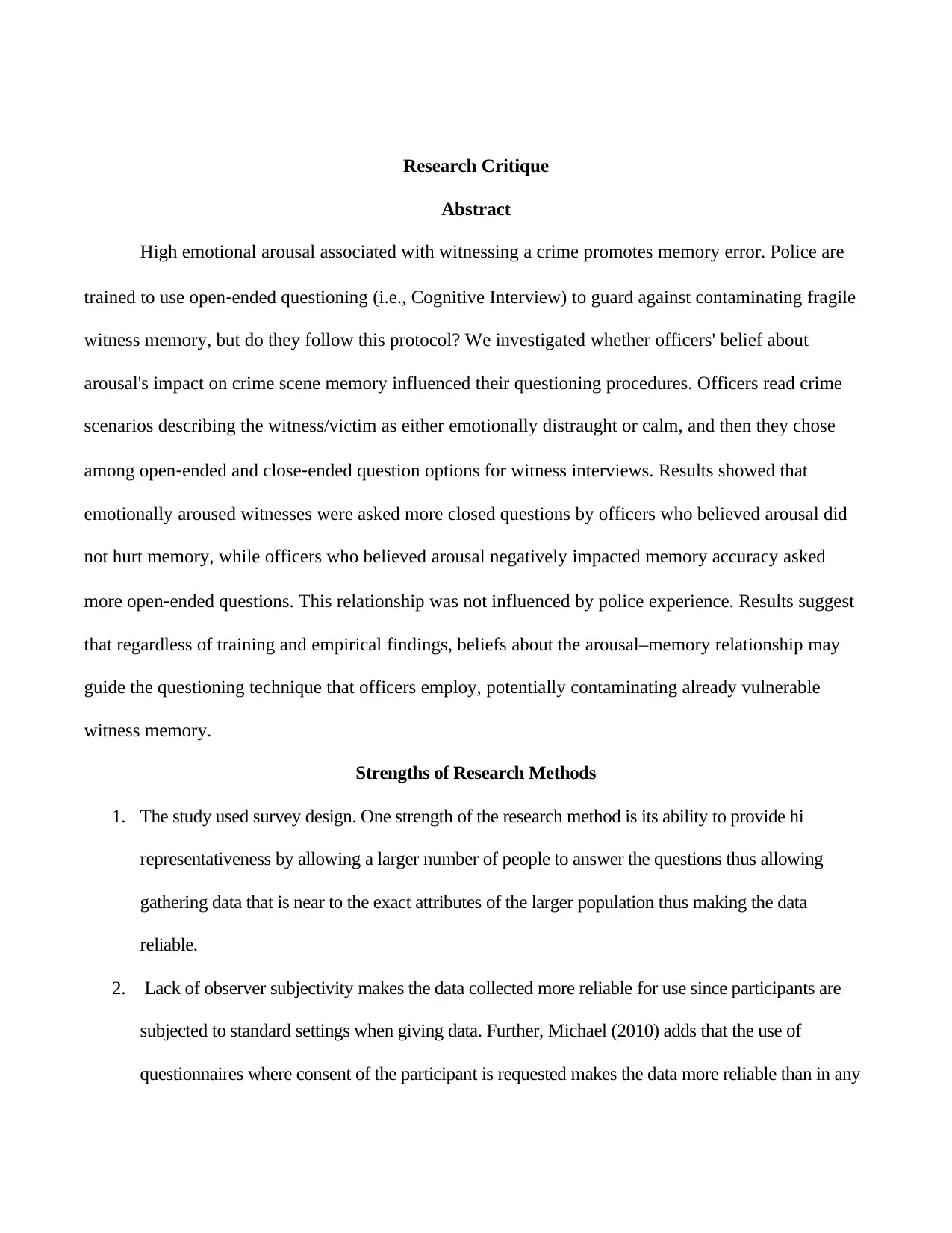
Research Critique
Abstract
High emotional arousal associated with witnessing a crime promotes memory error. Police are
trained to use open‐ended questioning (i.e., Cognitive Interview) to guard against contaminating fragile
witness memory, but do they follow this protocol? We investigated whether officers' belief about
arousal's impact on crime scene memory influenced their questioning procedures. Officers read crime
scenarios describing the witness/victim as either emotionally distraught or calm, and then they chose
among open‐ended and close‐ended question options for witness interviews. Results showed that
emotionally aroused witnesses were asked more closed questions by officers who believed arousal did
not hurt memory, while officers who believed arousal negatively impacted memory accuracy asked
more open‐ended questions. This relationship was not influenced by police experience. Results suggest
that regardless of training and empirical findings, beliefs about the arousal–memory relationship may
guide the questioning technique that officers employ, potentially contaminating already vulnerable
witness memory.
Strengths of Research Methods
1. The study used survey design. One strength of the research method is its ability to provide hi
representativeness by allowing a larger number of people to answer the questions thus allowing
gathering data that is near to the exact attributes of the larger population thus making the data
reliable.
2. Lack of observer subjectivity makes the data collected more reliable for use since participants are
subjected to standard settings when giving data. Further, Michael (2010) adds that the use of
questionnaires where consent of the participant is requested makes the data more reliable than in any
Abstract
High emotional arousal associated with witnessing a crime promotes memory error. Police are
trained to use open‐ended questioning (i.e., Cognitive Interview) to guard against contaminating fragile
witness memory, but do they follow this protocol? We investigated whether officers' belief about
arousal's impact on crime scene memory influenced their questioning procedures. Officers read crime
scenarios describing the witness/victim as either emotionally distraught or calm, and then they chose
among open‐ended and close‐ended question options for witness interviews. Results showed that
emotionally aroused witnesses were asked more closed questions by officers who believed arousal did
not hurt memory, while officers who believed arousal negatively impacted memory accuracy asked
more open‐ended questions. This relationship was not influenced by police experience. Results suggest
that regardless of training and empirical findings, beliefs about the arousal–memory relationship may
guide the questioning technique that officers employ, potentially contaminating already vulnerable
witness memory.
Strengths of Research Methods
1. The study used survey design. One strength of the research method is its ability to provide hi
representativeness by allowing a larger number of people to answer the questions thus allowing
gathering data that is near to the exact attributes of the larger population thus making the data
reliable.
2. Lack of observer subjectivity makes the data collected more reliable for use since participants are
subjected to standard settings when giving data. Further, Michael (2010) adds that the use of
questionnaires where consent of the participant is requested makes the data more reliable than in any
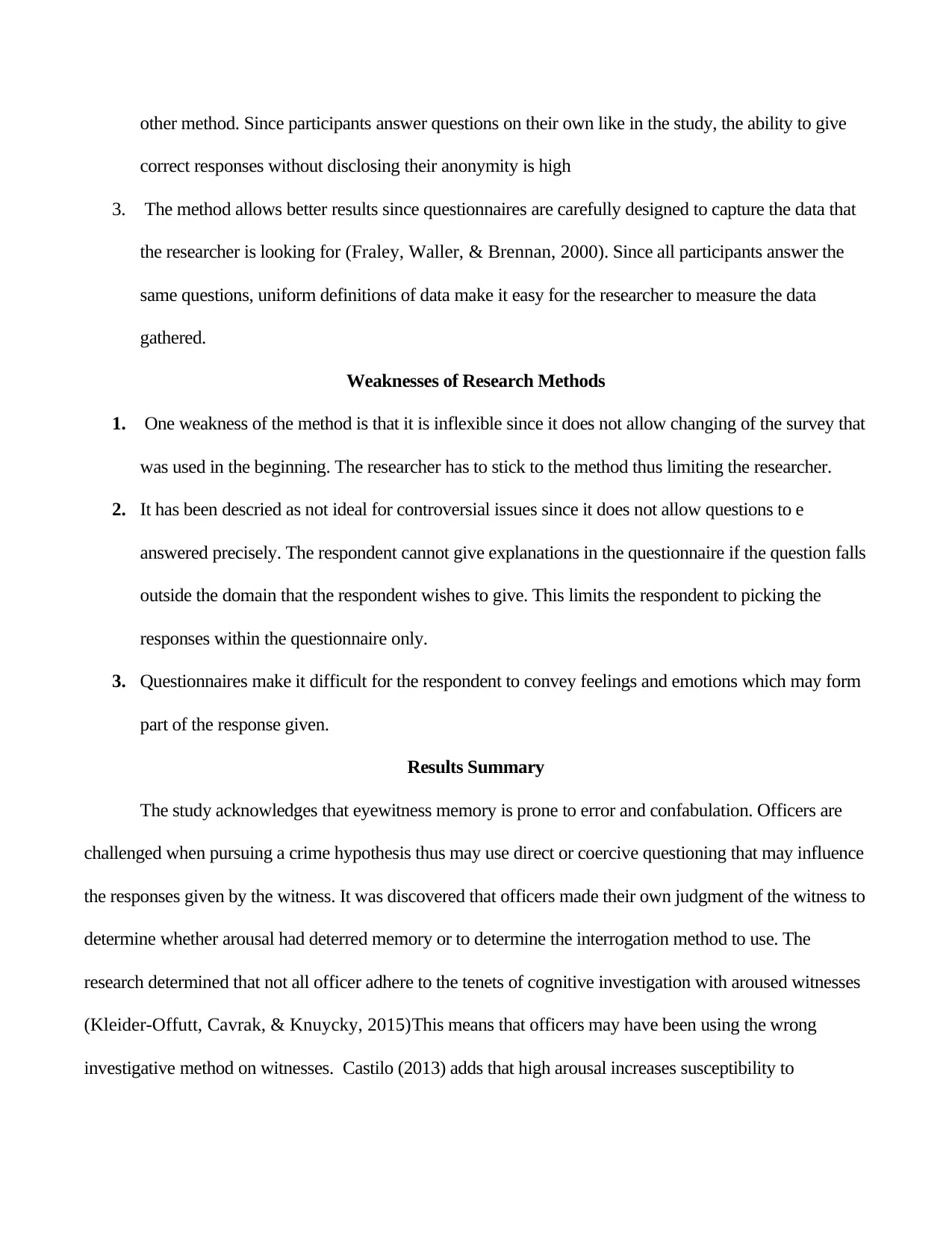
other method. Since participants answer questions on their own like in the study, the ability to give
correct responses without disclosing their anonymity is high
3. The method allows better results since questionnaires are carefully designed to capture the data that
the researcher is looking for (Fraley, Waller, & Brennan, 2000). Since all participants answer the
same questions, uniform definitions of data make it easy for the researcher to measure the data
gathered.
Weaknesses of Research Methods
1. One weakness of the method is that it is inflexible since it does not allow changing of the survey that
was used in the beginning. The researcher has to stick to the method thus limiting the researcher.
2. It has been descried as not ideal for controversial issues since it does not allow questions to e
answered precisely. The respondent cannot give explanations in the questionnaire if the question falls
outside the domain that the respondent wishes to give. This limits the respondent to picking the
responses within the questionnaire only.
3. Questionnaires make it difficult for the respondent to convey feelings and emotions which may form
part of the response given.
Results Summary
The study acknowledges that eyewitness memory is prone to error and confabulation. Officers are
challenged when pursuing a crime hypothesis thus may use direct or coercive questioning that may influence
the responses given by the witness. It was discovered that officers made their own judgment of the witness to
determine whether arousal had deterred memory or to determine the interrogation method to use. The
research determined that not all officer adhere to the tenets of cognitive investigation with aroused witnesses
(Kleider‐Offutt, Cavrak, & Knuycky, 2015). This means that officers may have been using the wrong
investigative method on witnesses. Castilo (2013) adds that high arousal increases susceptibility to
correct responses without disclosing their anonymity is high
3. The method allows better results since questionnaires are carefully designed to capture the data that
the researcher is looking for (Fraley, Waller, & Brennan, 2000). Since all participants answer the
same questions, uniform definitions of data make it easy for the researcher to measure the data
gathered.
Weaknesses of Research Methods
1. One weakness of the method is that it is inflexible since it does not allow changing of the survey that
was used in the beginning. The researcher has to stick to the method thus limiting the researcher.
2. It has been descried as not ideal for controversial issues since it does not allow questions to e
answered precisely. The respondent cannot give explanations in the questionnaire if the question falls
outside the domain that the respondent wishes to give. This limits the respondent to picking the
responses within the questionnaire only.
3. Questionnaires make it difficult for the respondent to convey feelings and emotions which may form
part of the response given.
Results Summary
The study acknowledges that eyewitness memory is prone to error and confabulation. Officers are
challenged when pursuing a crime hypothesis thus may use direct or coercive questioning that may influence
the responses given by the witness. It was discovered that officers made their own judgment of the witness to
determine whether arousal had deterred memory or to determine the interrogation method to use. The
research determined that not all officer adhere to the tenets of cognitive investigation with aroused witnesses
(Kleider‐Offutt, Cavrak, & Knuycky, 2015). This means that officers may have been using the wrong
investigative method on witnesses. Castilo (2013) adds that high arousal increases susceptibility to
⊘ This is a preview!⊘
Do you want full access?
Subscribe today to unlock all pages.

Trusted by 1+ million students worldwide
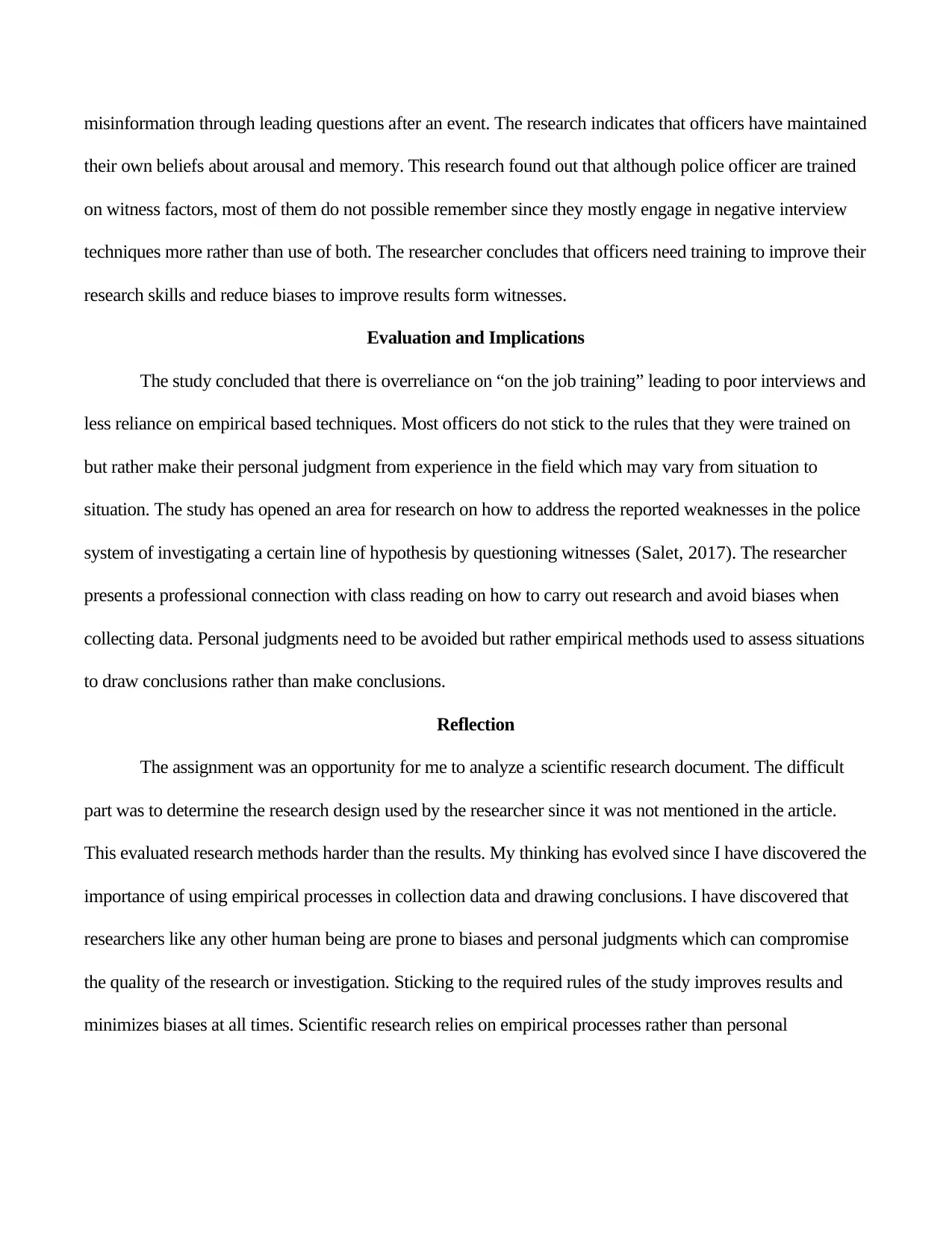
misinformation through leading questions after an event. The research indicates that officers have maintained
their own beliefs about arousal and memory. This research found out that although police officer are trained
on witness factors, most of them do not possible remember since they mostly engage in negative interview
techniques more rather than use of both. The researcher concludes that officers need training to improve their
research skills and reduce biases to improve results form witnesses.
Evaluation and Implications
The study concluded that there is overreliance on “on the job training” leading to poor interviews and
less reliance on empirical based techniques. Most officers do not stick to the rules that they were trained on
but rather make their personal judgment from experience in the field which may vary from situation to
situation. The study has opened an area for research on how to address the reported weaknesses in the police
system of investigating a certain line of hypothesis by questioning witnesses (Salet, 2017). The researcher
presents a professional connection with class reading on how to carry out research and avoid biases when
collecting data. Personal judgments need to be avoided but rather empirical methods used to assess situations
to draw conclusions rather than make conclusions.
Reflection
The assignment was an opportunity for me to analyze a scientific research document. The difficult
part was to determine the research design used by the researcher since it was not mentioned in the article.
This evaluated research methods harder than the results. My thinking has evolved since I have discovered the
importance of using empirical processes in collection data and drawing conclusions. I have discovered that
researchers like any other human being are prone to biases and personal judgments which can compromise
the quality of the research or investigation. Sticking to the required rules of the study improves results and
minimizes biases at all times. Scientific research relies on empirical processes rather than personal
their own beliefs about arousal and memory. This research found out that although police officer are trained
on witness factors, most of them do not possible remember since they mostly engage in negative interview
techniques more rather than use of both. The researcher concludes that officers need training to improve their
research skills and reduce biases to improve results form witnesses.
Evaluation and Implications
The study concluded that there is overreliance on “on the job training” leading to poor interviews and
less reliance on empirical based techniques. Most officers do not stick to the rules that they were trained on
but rather make their personal judgment from experience in the field which may vary from situation to
situation. The study has opened an area for research on how to address the reported weaknesses in the police
system of investigating a certain line of hypothesis by questioning witnesses (Salet, 2017). The researcher
presents a professional connection with class reading on how to carry out research and avoid biases when
collecting data. Personal judgments need to be avoided but rather empirical methods used to assess situations
to draw conclusions rather than make conclusions.
Reflection
The assignment was an opportunity for me to analyze a scientific research document. The difficult
part was to determine the research design used by the researcher since it was not mentioned in the article.
This evaluated research methods harder than the results. My thinking has evolved since I have discovered the
importance of using empirical processes in collection data and drawing conclusions. I have discovered that
researchers like any other human being are prone to biases and personal judgments which can compromise
the quality of the research or investigation. Sticking to the required rules of the study improves results and
minimizes biases at all times. Scientific research relies on empirical processes rather than personal
Paraphrase This Document
Need a fresh take? Get an instant paraphrase of this document with our AI Paraphraser

understanding of the situation. Researchers need to stick to the conventional rules when collecting data to
maximize results reliability.
maximize results reliability.
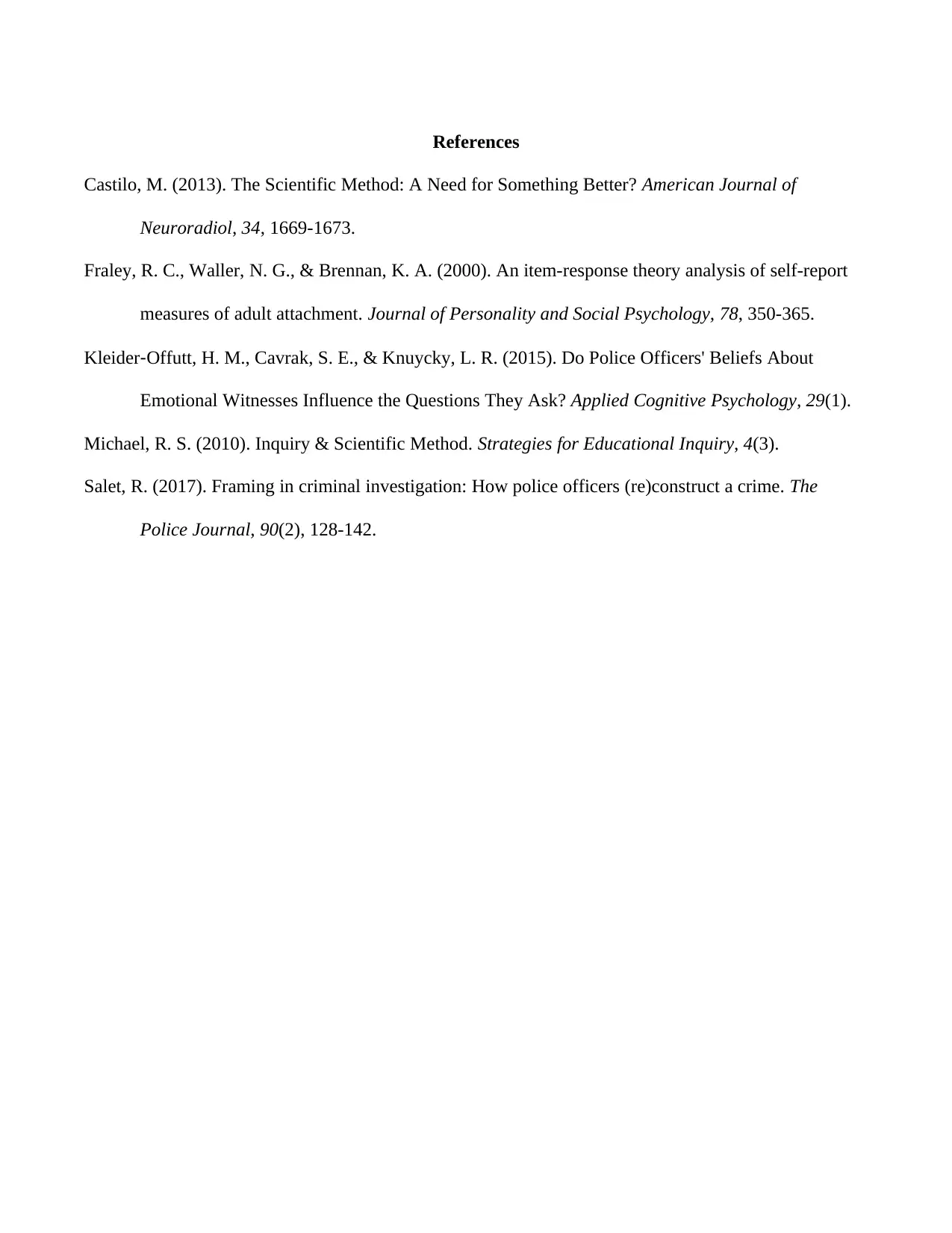
References
Castilo, M. (2013). The Scientific Method: A Need for Something Better? American Journal of
Neuroradiol, 34, 1669-1673.
Fraley, R. C., Waller, N. G., & Brennan, K. A. (2000). An item-response theory analysis of self-report
measures of adult attachment. Journal of Personality and Social Psychology, 78, 350-365.
Kleider‐Offutt, H. M., Cavrak, S. E., & Knuycky, L. R. (2015). Do Police Officers' Beliefs About
Emotional Witnesses Influence the Questions They Ask? Applied Cognitive Psychology, 29(1).
Michael, R. S. (2010). Inquiry & Scientific Method. Strategies for Educational Inquiry, 4(3).
Salet, R. (2017). Framing in criminal investigation: How police officers (re)construct a crime. The
Police Journal, 90(2), 128-142.
Castilo, M. (2013). The Scientific Method: A Need for Something Better? American Journal of
Neuroradiol, 34, 1669-1673.
Fraley, R. C., Waller, N. G., & Brennan, K. A. (2000). An item-response theory analysis of self-report
measures of adult attachment. Journal of Personality and Social Psychology, 78, 350-365.
Kleider‐Offutt, H. M., Cavrak, S. E., & Knuycky, L. R. (2015). Do Police Officers' Beliefs About
Emotional Witnesses Influence the Questions They Ask? Applied Cognitive Psychology, 29(1).
Michael, R. S. (2010). Inquiry & Scientific Method. Strategies for Educational Inquiry, 4(3).
Salet, R. (2017). Framing in criminal investigation: How police officers (re)construct a crime. The
Police Journal, 90(2), 128-142.
⊘ This is a preview!⊘
Do you want full access?
Subscribe today to unlock all pages.

Trusted by 1+ million students worldwide
1 out of 6
Related Documents
Your All-in-One AI-Powered Toolkit for Academic Success.
+13062052269
info@desklib.com
Available 24*7 on WhatsApp / Email
![[object Object]](/_next/static/media/star-bottom.7253800d.svg)
Unlock your academic potential
Copyright © 2020–2026 A2Z Services. All Rights Reserved. Developed and managed by ZUCOL.





